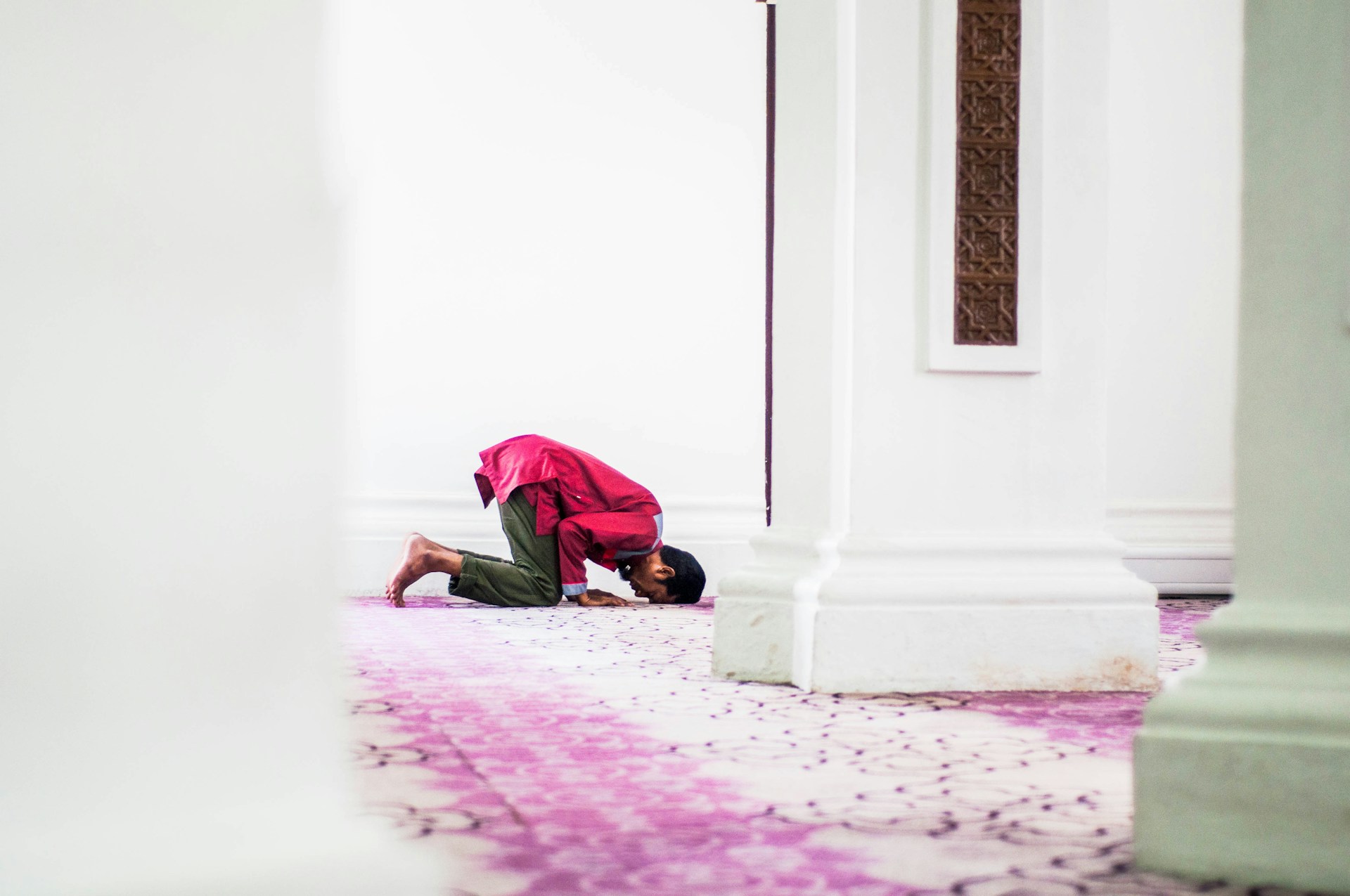
In the Name of Allah—the Most Compassionate, Most Merciful.
The fundamental position of prostration in Muslim prayer is known as sujood.
Lowering our foreheads to the floor is a sign of respect and humility. This profound act of devotion also presents a unique opportunity for supplication.
When prostrating before Allah, our bodies are closest to the earth as we connect with our Creator on a deeper level. Bowing our head to the ground in prostration increases the likelihood that Allah SWT accepts our supplication.
Understanding how to supplicate in prostration is important. We’ll go into detail on how to make dua in sujood.
What is Sujood?

The hadiths, sayings of the Prophet Muhammad (PBUH), place importance on the virtues of prostration. The closeness to God during prostration creates an opportune moment for supplication.
Muslims can express their needs and gratitude to Allah SWT in this most sincere posture. Supplication when prostrating before Allah (SWT) will result in full benefits of reciting them during or after namaz.
Can you make dua in sujood?
During prostration, it is normal and advised to offer supplication. Numerous hadiths from the Prophet Muhammad (PBUH) provide credence to supplicating during these times.
prostration is a special time for supplicating. An individual who makes a sijdah becomes connected to Allah SWT. Prostration is one of the best times to express gratitude, aspirations, and wishes.
Can you make dua in sujood during fard salah?
A person shows humility and reverence with prostration. Prostration is one of the times in which the servant is closest to Allah (SWT). So, one may utilize that time to supplicate for seeking forgiveness or offering gratitude.
The recommended supplication when prostrating before Allah (SWT) during the fard salah is:
While the times of prostration is primarily for glorifying Allah SWT and recited for specific supplications, the question arises can you supplicate when you make sujood after salah prayer times?
And the answer is yes. You can recite any forgiveness dua when prostrating after fard or sunnah prayers. Our prophet Muhammad (PBUH) recommended making dua with tajweed during prostration before and after the azaan or call to prayer by the muezzin.
What about during Tahajjud prayer?
One of the most profound spiritual activities is to recite supplication during Tahajjud’s optional night prayer. The peace of the night that is obtained by Tahajjud namaz is a special time for focus and meditative calm.
The Prophet Muhammad (PBUH) emphasized the need to establish prayer in Tahajjud. Therefore, these are special times to request Allah (SWT) for guidance, forgiveness, and the blessings that follow it.
Supplication during tahajjud prayer is the same as the one in fard prayers i.e.
You can also do sajdah after tahajjud namaz and make any dua after salah that you desire.
Step by Step guide on how to make a dua in sujood

This is a step-by-step guide explaining how to offer supplication when prostrating before Allah.
- Prostrate: Lower yourself to the ground. Touch your nose, forehead, palms, knees, and the tips of each foot to the ground.
- Glorify Allah: Say “Subhana Rabbiyal A’la (Glory be to Allah My Lord, the Most High).
- Supplication: You should start the supplication by saying praise Allah (SWT) and bless our Prophet Muhammad (PBUH). Then, you should make a supplication seeking help from Allah (SWT) Almighty.
Can I make dua in sujood in my own language?
While it is recommended that you recite Arabic duas, you can substitute the Arabic supplication with language in your own tongue. All languages such as English, Urdu, Hindi, and others are understood by Allah SWT.
“Being sincere in your own heart is important when making a supplication.”
Imagine you are confiding in a friend. The knowledge that your friend is sincerely committed to your good and deeply concerned about you will encourage you to confide in him.
In the same manner, Allah (SWT) knows your “inmost self”. You must frequently state your wants and desires multiple times in any language with complete sincerity, trusting entirely in Allah’s (SWT) vast wisdom and warm affection.
What is the best dua to read during sujood?
While there’s no single “best” supplication, many recommended supplications exist for recitation during prostration.
Here’s a selection of authentic words of supplication taught by the Prophet Muhammad (PBUH). The English transliteration of supplications that you can receive between sujood or during ruku along with their literal translation are as follows.
A plea for forgiveness, a cornerstone of Islamic spirituality:
English Translation
A supplication encompassing themes of belief, forgiveness, and gratitude:
English Translation
Can I thank Allah (SWT) in Sujood?
Expressing thanks is highly recommended in times of prostration. Gratitude in prostration is recommended in Quran that improves your relationship with God and promotes optimism.
Praising Allah (SWT) is one of the best virtues that will be rewarded in this world and hereafter. A grateful heart has a strong connection to Allah SWT. You must offer supplication for all the little things in life and for showing gratitude for all the blessings.
You should make supplication in a genuine manner to communicate your relationship with Allah. Authenticity is one of the virtues that far outweighs flowery language.
Consider prostration as a private conversation with your Lord
Speak from the depths of your heart, shedding all pretense and formality to thank Allah (SWT) for all his favours and blessings.
Hadiths about duas during sujood
Abu Huraira reported:
The Messenger of Allah, peace and blessings be upon him, used to say in his prostration,
Summary – How to make dua in sujood
Prostration presents a perfect opportunity to make a dua. Remember that authenticity is crucial. Invoke blessings upon the Prophet Muhammad (PBUH), praise Allah SWT, and offer a heartfelt supplication in times of prostration in Arabic, or your mother tongue in English, Urdu, Hindi, or any other language.
You should recognize prostration as a chance to speak with your Creator personally. Pour out your dreams, concerns, and gratitude in those moments of total surrender, knowing that the One who loves you most will hear and understand what you have to say.






